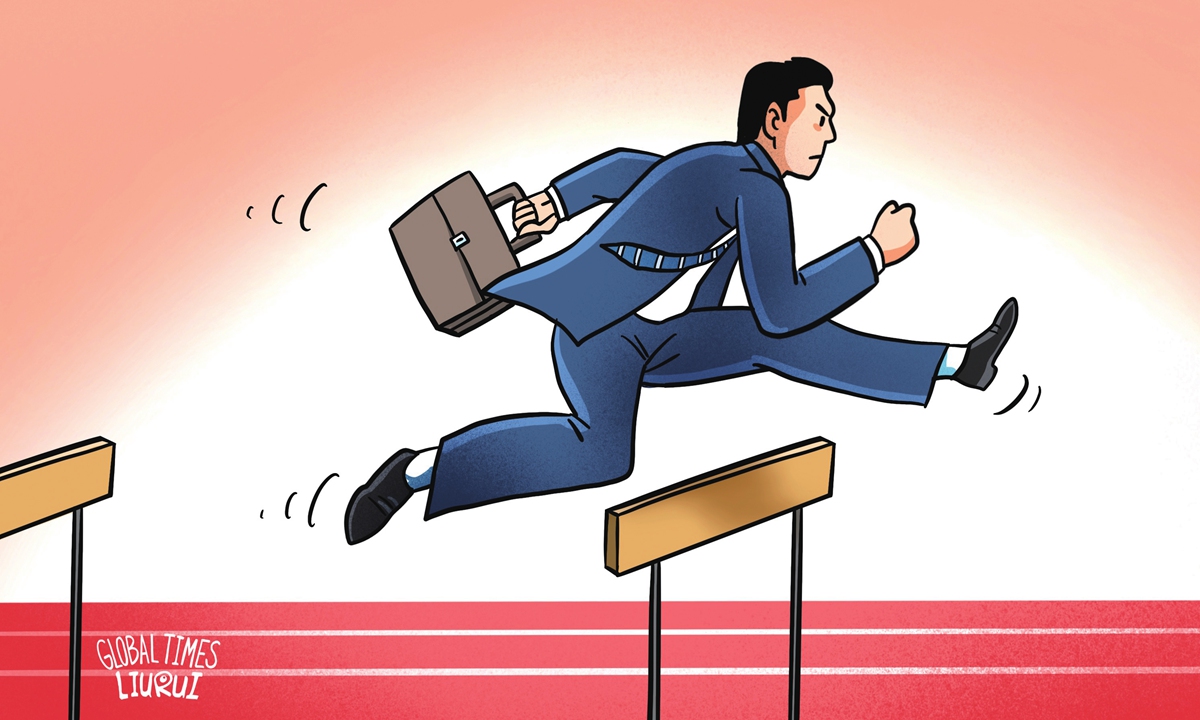Adhering to problem-focused approach a distinctive characteristic of China’s reform

Illustration: Liu Rui/GT
Since the Third Plenary Session of the 11th Central Committee of the Communist Party of China (CPC) in 1978, the focus on economic structural reform has breathed new life into China's economy. China has made historic achievements and undergone significant transformations, especially since the 18th National Congress of the CPC. A crucial lesson from this experience is the emphasis on a problem-focused approach, where addressing practical issues serves as a critical breakthrough to advance progress.
Nowadays, the ideological, practical, institutional foundations, and public support of China's reform have become increasingly solid. However, it must be recognized that some systemic and mechanistic flaws, as well as issues of unbalanced and insufficient development, still exist. People have new expectations toward reform, and China has reached a critical moment that demands a more pragmatic and targeted approach.
The Third Plenary Session of the 20th Central Committee of the CPC proposed in 2024, "Regarding economic structural reform as the spearhead and greater social fairness and justice and improvements in the people's wellbeing as our ultimate objectives, we will make our reforms more integrated, focused and effective. We will work to better adapt the relations of production to the productive forces, the superstructure to the economic base and national governance to social development so as to provide strong impetus and institutional support for Chinese modernization."
Emphasizing a problem-centered approach is not only a method which puts theory into practice, but it also measures one's capability and proficiency. It represents both a distinctive feature and an important lesson learned from implementing comprehensive reforms.
Addressing issues directly is a prerequisite. The courage, confidence and resilience to diagnose and confront issues without shying away from difficulties or evading responsibilities are fundamental traits of CPC members. Every era faces its own set of problems. Reform that targets these issues recognizes the universal and objective nature of contradictions. To truly address problems with determination and insight, we must confront them directly, focus on resolving them and pursue effective solutions.
Pinpointing the key problems is crucial. Since the 18th National Congress of the Party, both the domestic and international landscapes have undergone extensive and profound changes. The primary social contradiction has shifted, and reform, development and stability are now confronted with inescapable, deep-seated contradictions. External pressures and containment efforts could escalate at any moment, while issues of unbalanced, uncoordinated and unsustainable development remain pronounced. The external pressures of a slowing global economy, along with the potential occurrence of "black swan" and "grey rhino" incidents, highlight the urgency. To further deepen reforms comprehensively, it is necessary to meticulously identify and accurately pinpoint these issues, and then address them in a targeted manner.
Further comprehensive deepening of reform involves addressing major institutional and systemic issues that need to be resolved in the process of advancing Chinese modernization. These include: Key problems and bottlenecks that hinder the establishment of a new development pattern and the promotion of high-quality development, such as obstacles to building a high-level socialist market economy system; sour points and challenges affecting the development environment and people's livelihoods, including issues related to the "dual carbon" goal, insufficient resources for quality education, healthcare and elderly care, as well as imbalances in urban-rural public services that concern and trouble the general public; social focus and hotspot issues, such as issues related to income inequality, employment, social security system coverage and some officials' formalism and bureaucracy.
Resolving issues is the core focus. Reform is an ongoing process, and further comprehensive deepening of reform must follow and target specific problems, with the core aim being to address these problems directly. Solving issues is the key to implementing comprehensive deepening of reform. It is essential to tackle challenges such as aligning reform plans with actual conditions, overcoming resistance in interest adjustments and ensuring responsibility in implementing reforms.
We need to focus on urgent and pressing issues in people's daily lives, address core problems in key areas closely related to Chinese modernization, and introduce a series of effective and widely recognized measures. By overcoming difficulties and ensuring precise and detailed implementation, we can better align reforms with developmental needs, people's expectations, and public sentiment, thereby enhancing the accuracy, relevance, and effectiveness of reform measures. This approach will help effectively prevent and resolve major risks and continuously boost economic and social development.
Facing problems directly requires courage, identifying problems demonstrates skills, and solving problems reflects capability. Further deepening of reform will inevitably challenge vested interests and involve significant and challenging tasks. To effectively implement reform measures and resolve issues, we must thoroughly analyze the root causes of problems, assess their characteristics rationally, understand their evolving trends and address each issue systematically. This approach will help mobilize enthusiasm across all sectors and usher in a new phase of comprehensive reform.
The author is dean of the School of Governance of Beijing Normal University. opinion@globaltimes.com.cn

